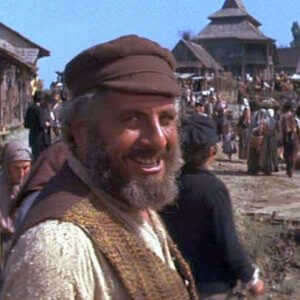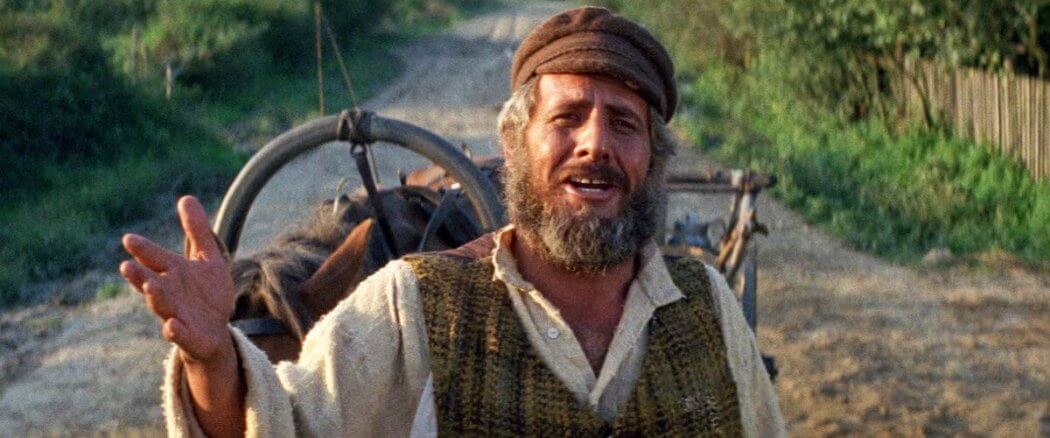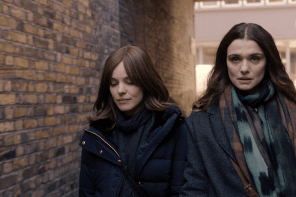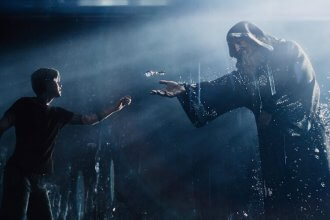I revisited Fiddler on the Roof kicking and screaming. The problem wasn’t musicals; West Side Story is one of my favorite films. The problem was my memories. You see, Fiddler was one of my Grandpa’s most beloved movies, and, bless his heart, he tried on more than one occasion to make it mine. Let’s face it – as a kid, there were cooler movies to like. I was living in the world of Jurassic Park and Jaws. A quaint film about singing Jews was the last thing on my wish list.
Thankfully, with age comes maturity, and I eventually decided to give the movie one more try. Grandpa was right. Fiddler is a wonderful film – a soaring epic about strange people with strange practices struggling with problems familiar to us all.
The town is Anateyka. The slogan is “tradition.” Being a Jew here means ordering your life around a carefully prescribed set of customs. Work grinds to a halt at the end of the week to make way for the Sabbath. A nosy lady named the “matchmaker” stops by uninvited to give advice on potential suitors. And, at the mere shake of a hand, the man of the house decides which husbands will marry his daughters.
This last custom is the one on center stage in Fiddler. Tevye, the main character of the story, has three daughters of marrying age: Tzeitel, Hodel, and Chava. But as determined as Tevye is to handpick their husbands, his daughter’s hearts are blinded by love. Thus, Tevye faces a dilemma: over-rule the men they’ve chosen in the name of tradition or give in and relinquish authority as the man of the house.
Dancing Through Life
Tevye is a good father. He graciously places his daughters’ happiness above his pride. Played perfectly by the actor Topol, Tevye is an inspiring portrait of a Godly man. He tirelessly tends to his family’s needs, he is affectionate and selfless to everyone he meets, and he is a man of good humor who takes both poverty and affliction in stride. Tevye also maintains a unique relationship with God – talking to Him out loud like a close friend, and chiding Him playfully when problems arise. This is what a life of “praying without ceasing” looks like.
 However, Fiddler is more than a mere character study. This is a film filled to the brim with music, dancing, and joy. The Jews of Anateyka know oppression – they are governed by a Czar hell-bent on driving them away from the city gates. But they have learned to be joyful despite the circumstance. And when there is a cause for celebration, they know how to party.
However, Fiddler is more than a mere character study. This is a film filled to the brim with music, dancing, and joy. The Jews of Anateyka know oppression – they are governed by a Czar hell-bent on driving them away from the city gates. But they have learned to be joyful despite the circumstance. And when there is a cause for celebration, they know how to party.
On a visceral level, the movie works wonders – due mainly to the soundtrack. These are playful, catchy, gorgeous songs that pump the movie full of life and single-handedly earn the film‘s classic status. “If I Were a Rich Man,” “Sunrise Sunset,” “Tradition” – these are songs most people know that haven’t even seen the movie, and there isn’t a weak one in the bunch.
But I guess that should be expected of a musical. What’s more surprising is how well the filmmaking holds up. The sets, direction, and cinematography on display here are remarkably top-notch. And unlike many play-to-film adaptations, nothing feels artificial.
Letting Go
But the most surprising thing of all is how applicable the themes in Fiddler are to modern day audiences. One with particular resonance for me was the trials of parenthood. I have three boys – ages 7, 5, and 2. But it was just last week that I brought them home from the hospital for the first time. Just a few days ago that they still couldn’t crawl yet. Just yesterday that they took their first, wobbly steps. Time as a parent flies by. And no matter how far away it seems now, I know letting go will be one of the hardest things I’ll face. One minute, daddy is center stage. The next, a spouse is there to replace him.
But letting go is doubly hard when children turn their back on your values. Try as I might to instill Godliness in my sons, there may come a time when they go their own way. And then, like Tevye, I’ll be faced with a choice: harden my heart in the name of tradition or love them anyway in the name of grace. I can’t say for sure what my choice would be, having never faced such a decision. But I do know one thing: when I was lost in the hell of my own making, I’m glad God chose love.
Fiddlers on the Roof
At various points in Fiddler, a musician is seen playing a violin on the rooftops of Anateyka. Who is this fiddler on the roof? I think the title can be taken on two levels. The first is the plight of the Jews. Here is a race that has been persecuted for centuries. One need only look at the Holocaust, or the end of Fiddler itself, to understand this portrait of a lonely fiddler desperately scratching out his tune on the precarious precipice of life and death.
But I feel the title has an even broader implication. One I never grasped as a raw, untested youth. I think we are all fiddlers on the roof. The foundation we live on – this thing called life – is a path fraught with unpredictability. Trials, sorrow, disease, and death – these aren’t abstract concepts. They’re reality. And yet we go on, joyously playing the song we’ve been given; hoping beyond hope that when it’s all said and done – when gravity finally wins – our music will carry on through the night.
L-Chaim.





